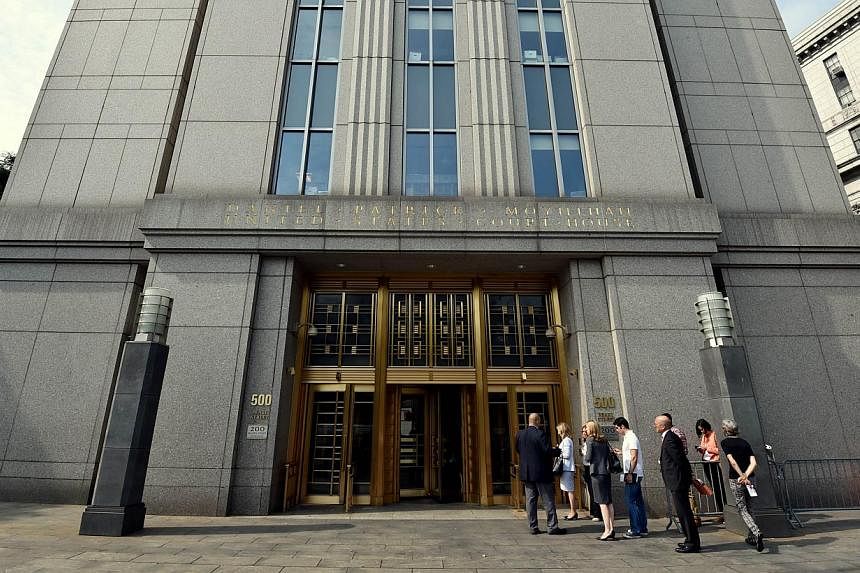NEW YORK (AFP) - The US judge presiding over Argentina's bitter dispute with two hedge funds left the country stranded in default on Friday, ordering it to hold new negotiations and calling for an end to "mistrust." Despite fighting tooth-and-nail, Buenos Aires has been unable to find a way around District Judge Thomas Griesa's ruling in favor of the hedge funds, which has blocked it from making payments to other creditors who agreed to take a 70 per cent write-down after the country's 2001 economic crisis.
It missed a US$539 million (S$ 671.5 million) payment due Wednesday after 11th-hour talks failed to break the impasse with the two American hedge funds, which refuse to accept a write-down.
Judge Griesa, who has blocked Argentina from servicing its restructured debt without also repaying the hedge funds the full US$1.3 billion it owes them, ordered the litigants to hold new talks.
"Let's go back to work," Judge Griesa said at a hearing in New York, the first since Argentina went into default.
He rejected Argentina's request to change the court-appointed mediator charged with marshaling the negotiations, attorney Daniel Pollack, and called for more trust.
The Argentine government has accused Judge Griesa and Mr Pollack of "incompetence" and called the judge an "agent" of the two hedge funds, NML Capital and Aurelius Capital Management.
Argentina's lawyer Jonathan Blackman told the court Friday that the country "no longer has confidence in the process" of negotiations being led by Pollack.
"Let's cool down any idea of mistrust," Judge Griesa said. "What can be trusted is proposals, recommendations. That is what is important." Argentina says paying the hedge funds - which it calls "vulture funds" - could expose it to claims for up to $100 billion from creditors who accepted a write-down, since they are entitled to equal treatment under what is called a Rights Upon Future Offers, or RUFO, clause.
Sources close to the case say JP Morgan and other banks are in negotiations with the hedge funds to settle the dispute by buying some or all of their bonds.
JP Morgan has declined to comment.
- 'Highly misleading' -
Argentine officials have denied the country is in default since the payment in question is currently sitting in a Bank of New York Mellon account, frozen by Griesa's ruling.
"Preventing someone from paying is not a default," President Cristina Kirchner said on national television Thursday.
But the judge called such statements "highly misleading," saying Argentina was offering to pay only the 92 per cent of creditors who agreed to a write-down.
Declarations of Argentina's default, meanwhile, continued piling up in the financial world.
The International Swaps and Derivatives Association, the group governing the derivatives trade, ruled the country in default Friday, triggering payments on an estimated $1 billion worth of credit insurance policies.
All 15 of the members of the ISDA committee ruling on credit events agreed that it had defaulted - including Elliott Management, the parent company of NML Capital.
That came after Standard & Poor's declared Argentina in "selective default" Wednesday and Fitch declared it in "restrictive default" Thursday.
Both terms indicate the country has defaulted on one or more of its financial commitments but continues to meet others.
Moody's simply called it a "default" and lowered its outlook on Argentine bonds to "negative," though it left its rating unchanged at "Caa1." Fitch warned the situation was hurting the nation's economy, and issued downgrades Friday on all 10 Argentine corporate borrowers it rates.
"The default by the Argentine government is likely to lead to higher inflation and will further pressure an economy that is already contracting," it said.
Analysts say the damage can still be controlled if the default is fleeting, but warn a lengthy standoff would deepen Argentina's recession, fuel inflation and unemployment, and further the country's isolation from global financial markets.
Argentina's 2001 default on US$100 billion in foreign debt, the largest in history at the time, plunged the country into crisis. Rioting left 33 people dead after the government froze savings accounts to halt a run on the banks.
But analysts say the global impact of the new default will be far smaller, as Argentina has since been locked out of international capital markets.

